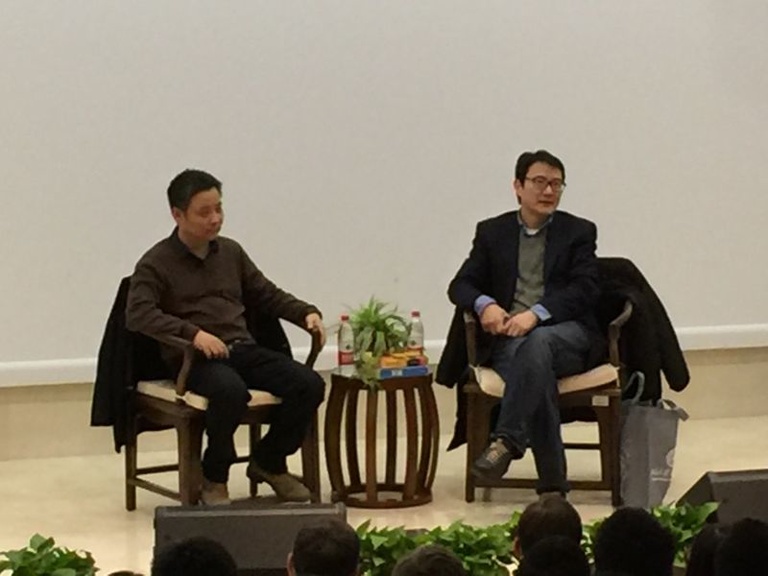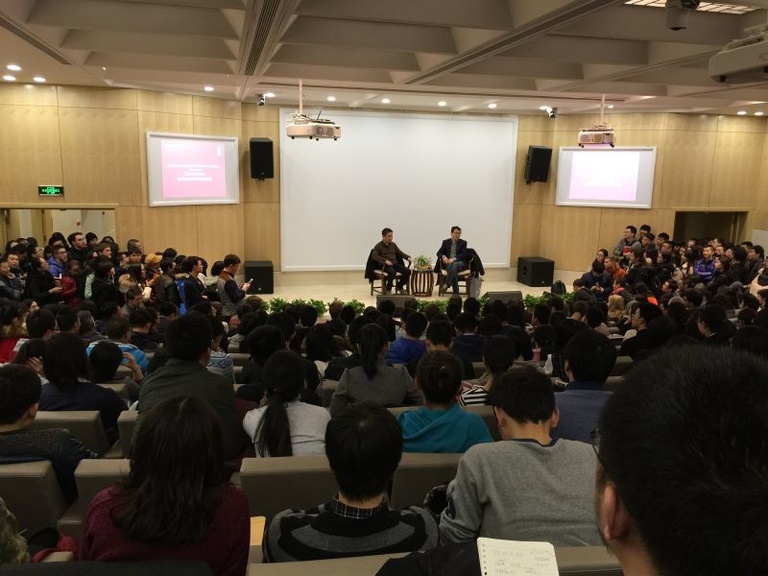
Yu Hua invited by Yenching Academy to speak at Peking University.
By Jeffrey Ding*
A Joke of Many Senses
Yu Hua, considered by many to be China’s greatest living author, begins his remarks with a joke. Brothers, a novel he calls his most important, has received critical acclaim abroad but encountered mixed reviews at home. International critics, under the pretense that Chinese critiques of the book were government-sponsored, flock furiously to the novel’s defense. In fact, Yu Hua sheepishly concludes, the negative assessments were offered spontaneously and freely by the Chinese public.
The joke is perfect in so many senses. The self-deprecation is quintessential Yu Hua. During the Q&A session that follows the lecture, one questioner asks Yu Hua if he considered how two characters represent the fragile masculinity in the Chinese psyche when writing the novel. He praises the analysis and then simply states, “Readers are smarter than authors, because they can always find something that never occurs to the author of the work.”
It pokes fun at both the self and the societal, much like Yu Hua’s writing technique. Commenting on how his works function as critiques of Chinese culture, “When trying to depict a sickened society, I try to write from the perspective of the sick patient not from the perspective of the doctor. Chinese intellectuals have this collective feature of criticizing society from the vantage point of a moral person, whereas I am of the opinion that if there are problems in a society then all of us share blame for these problems.” The only one of contemporary Chinese novelist to also write nonfiction social criticism, Yu Hua often describes his own participation in the senseless violence of the Cultural Revolution in China in Ten Words.
The joke is also absurd. The free press adopts a “party line” while the authoritarian society freely expresses their discontent. Yu Hua finds absurdity in the simple. In Brothers, he devotes over 17,000 characters to describing how a boy gains fame and minor fortune from peeping at women’s bottoms in a latrine. During his talk, he recounts seeing an ashtray and matches next to a “no smoking” sign in a hotel lobby.
But the joke also contains kernels of truth. For many outside of China, censorship equals no freedom of expression. Under this logic, the government must be behind the negative reviews of Yu Hua and other writers who satirize revolutionary violence and economic excess. Yu Hua argues that this preconception discredits the creativity of the Chinese people. For instance, references to June 4 – the date of the Tiananmen massacre of 1989 – are censored, so people use May 35 instead to refer to the incident. In an opinion for the New York Times, Yu Hua writes, “May 35th freedom is an art form. To evade censorship when expressing their opinions on the Internet, Chinese people give full rein to the rhetorical functions of language, elevating to a sublime level both innuendo and metaphor, parody and hyperbole, conveying sarcasm and scorn through veiled gibes and wily indirection.”[i]
In an interview with China File, Yu Hua calls Lu Xun his only spiritual guide.[ii] Lu Xun, known as China’s greatest modern writer for his allegories of China’s flawed national character, was both hailed as one of the fathers of China’s Communist Party and represented the intellectual independence that the Communist Party suppressed. Chinese people. In China, these types of contradictions are so ubiquitous that it seems foolish to even try to resolve them. Instead, the tension is managed, tolerated, harmonized. It’s no wonder Yu Hua jokes so much. He seeks to poke at this cognitive dissonance. The audience laughs, hoping it will go away.

Standing room only at Yu Hua’s talk
A Joke of Many Writers
Four Chinese writers, two Korean writers, and two Japanese writers attend a forum on East Asian Literature. Nearing the end of the talk, Yu Hua tells one more extended joke. The four Chinese authors make up a Mount Rushmore of sorts of living Chinese writers: Mo Yan (the first citizen of mainland China to be awarded the Nobel Prize in Literature), Wang Shuo (regarded by many as China’s most popular novelist), Su Tong (Man Booker International Prize nominee), and Yu Hua himself (first Chinese writer to receive the James Joyce Award).
“Why do you write?” is the question posed to all. Yu Hua says he chose literature simply because he hated being a dentist and writing offered the chance to sleep in instead of going to work. Mo Yan talks about his experience as a soldier who didn’t like rubber shoes and started to write to earn money to buy some leather shoes. Wang Shuo admits he wrote because publishing literary works was the only way to serve as a propaganda officer in a nearby navy hospital, where all the pretty girls worked. As for Su Tong, the only one of the group who attended college, he discusses how he fell in love with literature at college. When the audience’s laughter dims, Yu Hua recounts how Su Tong felt embarrassed at his lack of a “shameless” answer.
Yu Hua is a shameless joker, in the best sense of both words. He’ll make you laugh before making you cry.[iii]
[i] http://www.nytimes.com/2011/06/24/opinion/global/24iht-june24-ihtmag-hua-28.html?_r=1
[ii] http://www.chinafile.com/stranger-than-fiction
[iii] I’ve only read three of his books, so I can only personally recommend these three: To Live, China in Ten Words, Brothers
*Jeffrey Ding is a senior from Iowa City, IA studying political science, economics and Chinese at the University of Iowa. He will be spending this fall in Beijing, China on the CIEE Advanced Chinese Studies program and will continue living there next semester as he pursues an internship funded by a Boren Scholarship.